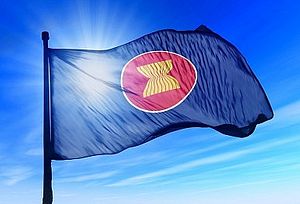In a curious turn of events, recent days have seen an enthusiastic discussion on the option of “joint patrols” by the Association of Southeast Asian Nations (ASEAN) members in the South China Sea. In fairness, the concept is not entirely alien to the region: since 2004, Malaysia, Singapore, Indonesia, and Thailand have been jointly involved in the Malacca Strait Patrols (MSP), collectively guarding one of the world’s most important waterways against piracy and other non-traditional security threats.
The MSP has been largely hailed as a successful demonstration of cooperative security in the developing world, providing invaluable lessons for troubled waters across the world. But the South China Sea is no Malacca Strait, especially because it involves no less than China — an extra-ASEAN power, with Mahanian ambitions of maritime domination in adjacent waters.
Unwilling to risk direct confrontation with its top trading partner (China), Washington has largely shunned much-needed “counter-provocation” operations to rein in Beijing’s sweeping territorial posturing across the Western Pacific. For years, there have been calls for the U.S. Navy and Coast Guard forces to more vigorously challenge China’s salami-slicing strategy in adjacent waters. So far, the Obama administration has even equivocated over whether territorial disputes in the South China Sea are covered by the 1951 Philippine-U.S. Mutual Defense Treaty, leaving a highly vulnerable Manila in strategic limbo.
Instead of directly challenging China’s expanding para-military patrols and construction activities, Washington has instead encouraged its regional allies to augment their maritime defensive capabilities, while negotiating greater “rotational access” to precious maritime outposts in Singapore and the Philippines. And recently, it has begun to prod the ASEAN to extend its joint maritime patrol concept to the South China Sea. Unsure of the ASEAN’s resolve and capabilities, Washington has also requested Japan to join the fray, as the Abe administration steps up its pivot to Southeast Asia.
Unsurprisingly, ASEAN has collectively responded to Washington’s proposal with a mixture of lethargy and skepticism, with the predictable exception of loyal allies such as the Philippines, which has enthusiastically embraced any form of external assistance to push back against China’s creeping incursion into its 200-nautical-miles Exclusive Economic Zone (EEZ). As the ASEAN struggles to assert its relevance vis-à-vis the South China Sea disputes, claimant states have reverted to classical balance of power calculus.
Hollow Regionalism
No wonder leading ASEAN experts have begun to question the relevance of the regional organization, bemoaning its lack of resolve before China’s repeated acts of provocation against ASEAN members, particularly the Philippines and Vietnam.
Bemoaning the “illusion” of ASEAN unity, Singaporean diplomat Barry Desker has rightfully pointed out the glaring lack of internal coherence within the regional body: “The ability of external parties to shape the positions of ASEAN members on regional issues such as the competing maritime claims in the South China Sea could undermine efforts to create an agreed ASEAN view. As China exerts its influence on ASEAN members to prevent any decisions which could affect its preference for bilateral negotiations, it will be increasingly difficult to reach an ASEAN consensus.”
This should come as no surprise, veteran analyst Muthiah Alagappa argues, since “The foremost priority for ASEAN national leaders in the foreseeable future will be making strong nations and states at home to preserve their hold on power. Regional community building will be lower priority and likely to succeed only when it can contribute to or does not hinder realization of the primary national objectives of incumbent leaders.”
By all accounts, China has become an honorary ASEAN member, with a de facto veto over any decision which may directly affect Beijing’s interests both in economic and security matters. In an explicit rejection of America’s opposition to the China-led Asian Infrastructure Investment Bank (AIIB), all major ASEAN countries have joined the new regional financial entity, underlining Washington’s waning influence, especially in the economic sphere. After all, even America’s European allies have succumbed to the AIIB temptation, with Australia, South Korea, and Japan now re-considering their initial boycott of the Beijing-based bank.
Time for Minilateralism
The ASEAN has proven even more vulnerable to Chinese influence in security matters. Since the conclusion of the Declaration on the Conduct of Parties in the South China Sea (DoC) in 2002, which laid down the foundation of a more robust, legally-binding mechanism for the resolution of the territorial disputes, the ASEAN has failed to even finalize the negotiation of the guidelines of a Code of Conduct (CoC), let alone the complete agreement.
This is precisely why some ASEAN countries, particularly the Philippines and Vietnam, have increasingly been gravitating towards the minilateralist option: institutionalized coordination among highly like-minded states on specific areas of common interest. Since its mid-2012 standoff with China over the Scarborough Shoal, the Philippines has assiduously sought a quadrilateral, regular high-level meeting among ASEAN claimant states in the South China Sea. So far, however, only Vietnam has shown sustained and keen interest.
No wonder, the Philippines and Vietnam are more interested in augmenting their defense ties with extra-regional powers. The problem with this balancing approach, however, is that it highlights the limits of the ASEAN as the (supposedly) primary mechanism for conflict-prevention/management in the region – defeating the very purpose of regional integration in Southeast Asia.
Richard Javad Heydarian is an assistant professor in political science at De La Salle University, and a policy adviser at the Philippine House of Representatives. He has authored more than 400 articles and policy papers on Asian geopolitical affairs, writing for or interviewed by Foreign Affairs, BBC, Bloomberg, Al Jazeera, New York Times, Wall Street Journal, The National Interest, The Nation, and NPR among others. He is the author of “The Philippines: The US, China and the Struggle for Asia’s Pivot State”(London, forthcoming). Follow him @Richeydarian.

































